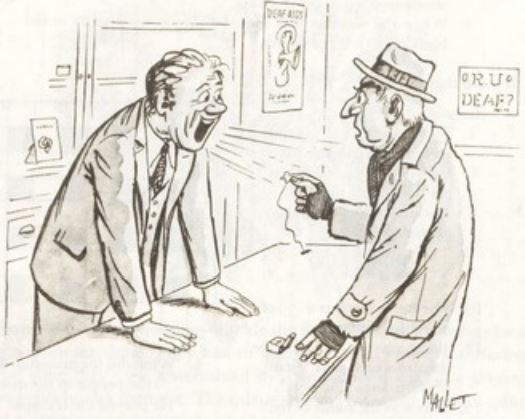
I can’t speak
 المؤلف:
L.A Hill
المؤلف:
L.A Hill
 المصدر:
Advanced steps to understanding
المصدر:
Advanced steps to understanding
 الجزء والصفحة:
14-1
الجزء والصفحة:
14-1
 1-9-2022
1-9-2022
 1532
1532

Mr. Richards worked in a shop which sold, cleaned and repaired hearing-aids. One day an old gentleman entered and put one down in front of him without saying a word.
‘What's the matter with it?' Mr. Richards said. The man did not answer. Of course Mr. Richards thought that the man must be deal and that his hearing-aid must be faulty, so he said again, more loudly, 'What's wrong with your hearing-aid, sir?' Again the man said nothing, so Mr. Richards shouted his question again as loudly as he could.
The man then took a pen and a piece of paper and wrote: 'It isn't necessary to shout when you're speaking to me. My ears are as good as yours. This hearing aid is my wife's not mine. I've just had a throat operation, and my problem is not that I can't hear, but that I can't speak.
A- Which of these sentences are true (T) and which are false (F)? Write T or F in the boxes.
- An old gentleman brought a hearing aid into the shop where Mr. Richards worked.
- The man did not answer Mr. Richards's question because he was deaf.
- Mr. Richards wrote his question down because the old gentleman could not hear him.
- The old gentleman answered Mr. Richards's question in writing.
- The hearing aid was the old gentleman's.
- The old gentleman couldn't speak.
B- Answer these questions.
- What did an old gentleman bring Mr. Richards one day?
- What did Mr. Richards ask him?
- And what did the old man say in reply?
- What did Mr. Richards think then?
- What did he do?
- How did the old man make Mr. Richards understand what he wanted?
- Was the old man deal?
- Why had he not spoken to Mr. Richards?
C- Put words which end in en in the spaces, whenever this is necessary.
When people repair things in shops, they sometimes:
- Make them flat, which means that they…. them:
- Make them smooth, which means that they ... them down:
- Make them stronger, which means that they ... them;
- Make them thinner, which means that they ... them down:
- Make them longer, which means that they...them;
- Make them shorter, which means that they... them;
- Make them wider, which means that they... them;
- Make them narrower, which means that they...them down;
- Make them sharp, which means that they... them;
- Or make them straight, which means that they them.
 الاكثر قراءة في Advanced
الاكثر قراءة في Advanced
 اخر الاخبار
اخر الاخبار
اخبار العتبة العباسية المقدسة


